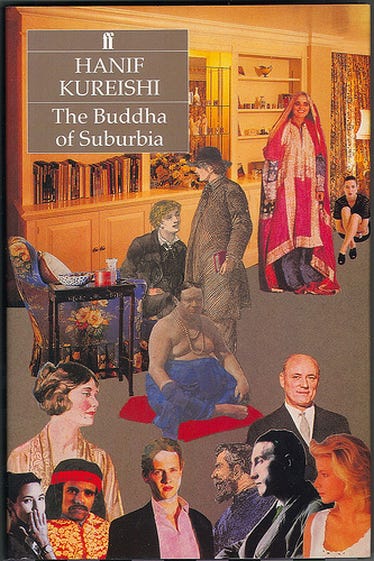Dear Readers,
I’ve recently been thinking a lot about the business of writing. How does one turn the ideas in their head into some kind of career? Who should listen or care, and what makes some writing vital?
All writing is a process. Ideas begin as one thing and come out as something else entirely. The form can change, as can the point of view. Your voice is an elusive, intangible tool that is ever-changing. But a piece of writing is only as good as the idea at the heart of it, so one must choose wisely.
I want to share a piece with you I published in the Guardian a few years ago. As always, if you have the means, it’d mean a great deal if you can support me, and keep this show on the road.
All first novels are letters to one’s parents, telling them how it was for you, an account of things they didn’t understand or didn’t want to hear.
It was the late 1980s, and I was in my early 30s, when I began to work on The Buddha of Suburbia. The success of My Beautiful Laundrette had given me confidence that the writing tone I’d found could be extended into the novel I’d wanted to write as a teenager. I had been no good at school, but always felt more alive than the people around me. I was a horny bookworm, and novels got through to me. I thought I’d do one; I did several.

They were not published. But I did write what became the first chapter of The Buddha of Suburbia, as a short story published in the London Review of Books in 1987. I believed that was that. Then I kept thinking there was more material. If people were not writing books about people like me, I’d write one myself, spitting out all the painful things, rudely, lightly. Someone said to me, write your pleasure. I did.
Reading the first paragraph of The Buddha now, I’m surprised to notice that the hero, Karim Amir, announces his nationality three times. I guess he was insecure. Like David Bowie, he was eager to find an identity, throw it away, and start again next day with another one, brand new.

In 2015, Zadie Smith wrote a lovely introduction. She describes discovering the book at school, which she calls a first for us “new-breeds”. She says: “Irresponsibility is an essential element of comic writing.” And Karim my avatar, who likes both boys and girls in bed, is determinedly wild and rash. But Karim knows something that most people don’t: that being a person of colour isn’t at all like being white. No white person thinks of themselves as a problem for others, a question, a perplexity. No one asks them where they’re really from. White people belong in the world. It’s theirs, they own it, and they don’t even appreciate it. But they do get defensive when you point it out. Karim understands that being a person of colour means being bullied. Yet while white people might consider themselves superior, it’s more original and enjoyable being underneath, laughing up at the poverty of privilege. Karim begins to get that his disadvantage is his advantage. Then he stops caring either way. He’s free.
If anyone thanks me for writing The Buddha I am always grateful, since I’m reminded of how a few decent people, along with some good stories, once got me out of a bit of a jam, and into a more open world. As I think about my novel today, I wish I were that boy again, free on his bike. But I know he’s still in me, funny, hopeful, rarin’ to go, always up for it, going somewhere.
Hanif xx





Hanif, this book, and then all of your work -- I’m a Kureishi-completist ;-) -- has meant so much to me. As a mixed East-Indian-American I was shocked to discover direct identification with your early narrative avatars but then, as your work expanded, I delighted in all your creations, regardless of identity-boxes. In no small measure you have showed me the way forward.
Also, I had the great good fortune of meeting you once after a screening of BUDDHA OF SUBURBIA at the Public Theatre in NYC. I was terribly shy and basically speechless but you offered me kind words and a signature on my copy of the screenplay for SAMMY AND ROSIE. You remain my David Bowie ;-) and I pray daily to the secular gods for your happiness and recovery.
Keep scribbling. Your mind is essential to so many.
I hope this piece was written very recently Hanif because from the tone it sounds as if you are in a more positive frame of mind. It sounds buoyant, I hope I'm right and that this is not just my hopeful assumption. Buddha is a marvelous funny and profound creation and Karim is a beautiful and complex character, much I suspect, like yourself. Xx Jane